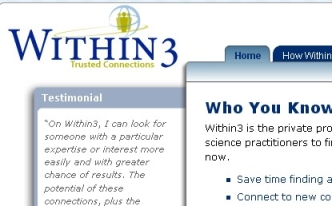The DNA Network |
| The Summer 2008 Genea-Blogger Group Games [The Genetic Genealogist] Posted: 10 Aug 2008 05:38 PM CDT I’ve decided to join the 2008 Genea-Blogger Group Games (see here for more info). I’m a little late, but the organizers have decided to allow entrants until tonight at 9:00pm PDT. The Opening Ceremonies were held on Friday. I’m hoping to put a genetic genealogy twist on my entries, if possible, to highlight how genetics can augment traditional genealogical research.
The categories I plan to participate in are:
|
| What do the little Boogers think about dog cloning? [Discovering Biology in a Digital World] Posted: 10 Aug 2008 04:42 PM CDT It justs gets weirder and weirder. You can find more of the story and more puppy pictures here. H/T to Jennifer - one of erv's commeters. Read the comments on this post... |
| 5 New Additions to the Health 2.0 Squad [ScienceRoll] Posted: 10 Aug 2008 12:53 PM CDT I’ve recently come across 5 services that may be useful for those interested in health 2.0.
 |
| What’s on the web? (10 August 2008) [ScienceRoll] Posted: 10 Aug 2008 12:06 PM CDT
 |
| We need to change the system [business|bytes|genes|molecules] Posted: 10 Aug 2008 10:55 AM CDT I return to one of my favorite topics, open data and data ownership. Discussions with some very smart people over time (including a recent one on Friendfeed) have convinced me that our problem does not necessarily lie in scientists being inherently protective of their data, but rather to a system that encourages them to do so. First let me throw out some oft-repeated mantras that drive my philosophy, mostly stolen from other wiser people. Raw data by itself has is not the value center. Value comes from the interpretation of these data. Data finds the data (then people find the people) (via Jeff Jonas and Jon Udell) Wherever you are, there is someone smarter somewhere else (Via Tim Bray, channeling Bill Joy) Now that we have got those thoughts out of the way, and lets assume that most people involved in science do care about science in general, and acknowledging that as humans we need recognition in some manner, the challenge lies not in trying to fit our desires into an existing, broken, system, but rather in taking this system, which is very long in the tooth and changing it. The science blogosphere, The BioGang, etc are but a small part of the scientific communities. Some of us have the ability to make change from within, some of us have a bigger pulpit than others, and some of us can only write about the changes we would like to see. So it’s going to take a while, but if pharma companies can agree to share pre-competitive biomarker data, then academics can change as well. I still maintain that raw data should be made public in a reasonable time. You might want to re-check the data quality, or perhaps your data was collected to support a hypothesis, and you have full right to test it out. But you can’t sit on that data. Complete your analysis and make it available. And if the data are collected for the sake of data collection (genome study, high throughput structure determination) then you must make it available ASAP. There is enough in there to keep many many people busy. The other aspect is data ownership. Large data sets of fundamental data belong in the public domain. Supporting data, data that supports a paper, or some hypothesis or discovery, I am not 100% sure about. I think there needs to be some form of attribution, especially if you don’t plan to publish the data in a paper. How do we manage that? I don’t know. Others have studied this for a longer time. How does this protect long term monetization prospects? Actually I think that’s the easy part, and I’ve covered it many times before. Sometimes I feel that it’s pointless to write about this subject, one I care about more than most. Then I remember how much I care. Related articles by Zemanta |
| Gene silencing may become new treatment for HIV [Mary Meets Dolly] Posted: 10 Aug 2008 09:01 AM CDT I think molecular biology is amazing. Here is another example of all the great things that are coming from the biotech industry. From WebMD:
|
| "Intelligent design is not a theory" says DI fellow. [Genomicron] Posted: 10 Aug 2008 07:38 AM CDT The Panda's Thumb (PT) has a short post giving a quote from Michael Medved, a new fellow at the Discovery Institute (DI) (which promotes intelligent design, or ID). In it, Medved notes that intelligent design is not a theory itself, but merely a challenge to evolution. We already knew that, of course, and well known ID advocates have made similar statements before1. What interested me was my reaction to seeing the PT post. My first thought was, "Ok, but what's the context?". Not that I expected PT to be disengenuously quote-mining (this is, instead, a major creationist maneuver), but I wanted to know why he would say such a thing and what the full quote might have been. PT links to the source, which is an interview in the Jerusalem Post in which Medved is asked about a variety of issues, most of them political, with just a short exchange on ID. Here is the relevant portion, in full. Speaking of your desire for this kind of particularity, you are a senior fellow at the Discovery Institute that studies and believes in Intelligent Design. How do you, as an Orthodox Jew, reconcile with this kind of generality - with the view of their being a hierarchy with a chief "designer" - while believing in and praying to a very specific God?This is actually quite interesting. What is happening is that a religious interviewer is expressing concern that ID is a challenge to God as the designer. This puts ID creationists in a tough position. In order to sound "sciency", they pretend that ID is not about God and say that the designer could be anything intelligent (God, gods, aliens). This is not science, and it is also not very good theology, as the interviewer indicates. As a result, ID creationists usually say one thing in debates (we can't know who the designer is) and another in speeches to religious groups (obviously, the designer is God). The thing is, there already are qualified people who constantly challenge evolutionary explanations. They are known as evolutionary biologists. We argue, we trash each other's papers as peer reviewers, and we force one another to present more convincing data on even the smallest issues. The outside commentary by ID creationists -- if indeed they are offering no testable alternatives (which they aren't) -- is not useful. Evolutionary biology will continue to study how complex features arise without creationists' challenges because it is the job of science to explain such things. And they will do it in the field, in the lab, and in the peer-reviewed literature. ____________ 1 Note that these are second-hand quotes so interpret them accordingly. "'I'm not pushing to have [ID] taught as an 'alternative' to Darwin, and neither are they," he says in response to one question about Discovery's agenda. ''What's being pushed is to have Darwinism critiqued, to teach there's a controversy. Intelligent design itself does not have any content." George Gilder, interviewed in the Boston Globe, July 27, 2005. "Easily the biggest challenge facing the ID community is to develop a full-fledged theory of biological design. We don't have such a theory right now, and that's a real problem. Without a theory, it's very hard to know where to direct your research focus. Right now, we've got a bag of powerful intuitions, and a handful of notions such as "irreducible complexity" and "specified complexity"—but, as yet, no general theory of biological design." Paul Nelson, interviewed in Touchstone vol 17, July/August, 2004. "I also don't think that there is really a theory of intelligent design at the present time to propose as a comparable alternative to the Darwinian theory, which is, whatever errors it might contain, a fully worked out scheme. There is no intelligent design theory that's comparable. Working out a positive theory is the job of the scientific people that we have affiliated with the movement. Some of them are quite convinced that it's doable, but that's for them to prove…No product is ready for competition in the educational world." Phillip Johnson, quoted in Berkeley Science Review, Spring 2006. |
| You are subscribed to email updates from The DNA Network To stop receiving these emails, you may unsubscribe now. | Email Delivery powered by FeedBurner |
| Inbox too full? | |
| If you prefer to unsubscribe via postal mail, write to: The DNA Network, c/o FeedBurner, 20 W Kinzie, 9th Floor, Chicago IL USA 60610 | |










No comments:
Post a Comment